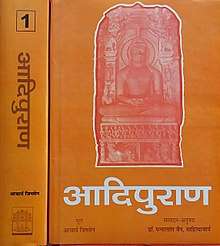Ādi purāṇa
Ādi purāṇa is a 9th century Sanskrit poem composed by Jinasena, a Digambara monk. It deals with the life of Rishabhanatha, the first Tirthankara.
| Ādi purāṇa | |
|---|---|
 Ādi purāṇa | |
| Information | |
| Religion | Jainism |
| Author | Jinasena |
| Language | Sanskrit |
| Period | 9th century |
| Part of a series on |
| Jainism |
|---|
 |
|
Jain prayers |
|
Ethics |
|
Major sects |
|
Texts |
|
Festivals
|
|
|
History
Adi Purana was composed by Jinasena (a Digambara monk) as a Sanskrit poem praising the life of first Tirthankara, Rishabhanatha. According to Jain tradition, it was composed in 9th century CE.[1][2][3][4]
Content
The work focusses in his own unique style the pilgrimage of a soul to perfection and attainment of mukti. In the work, the struggle for power and control over the entire world of two brothers Bharata and Bahubali, sons of Rishabhadeva. While Bahubali wins, he renounces the worldly pursuits in favor of his brother. Many Jaina Puranas of the Middle Ages found a role model in this work.
Famous quote
A famous quote from Adi Purana is-
By birth are all men equal unto one another; but they differ in respect of the progress they might make on the spiritual path.[5]
Kannada version
A 10th-century Kannada text written in Champu style, a mix of prose and verse, dealing with the ten lives of the first tirthankara, Adinatha in sixteen cantos. This work is known to be the first work of Kannada poet Adikavi Pampa (941 CE).[6] It is based on the original Sanskrit version by Jinasena acharya.
A court poet of Chalukya king Arikesari II, a Rashtrakuta feudatory, he is most known for his epics, Vikramarjuna Vijaya (Pampa Bharata) and Adipurana, both written in Champu style, which he created and served as the model for all future works in the Kannada. The works of Jain writers Adikavi Pampa, Sri Ponna and Ranna, collectively called the "three gems of Kannada literature", heralded the age of classical Kannada in the 10th century, the Medieval Kannada literature.[7]
See also
Notes
- Granoff 1993, p. 208.
- Caillat & Balbir 2008, p. 122.
- Upinder Singh 2016, p. 26.
- Jaini 1998, p. 78.
- Jain 2008, p. 111.
- Upinder Singh 2016, p. 29.
- Students' Britannica India, 1–5, Popular Prakashan, p. 78, ISBN 0-85229-760-2
References
- Jain, Champat Rai (2008), "XI: Bahubali", Risabha Deva - The Founder of Jainism, Bhagwan Rishabhdeo Granth Mala, ISBN 978-8177720228
- Caillat, Colette; Balbir, Nalini (2008), Jaina Studies: Volume 9 of Papers of the XIIth World Sanskrit Conference, held in Helsinki, Finland (13 - 18 July, 2003), Motilal Banarsidass Publisher, ISBN 9788120832473
- Adipurana, 2, Bhāratīya Jñānapīṭha, 2007, ISBN 978-81-263-0922-1
- Granoff, Phyllis (1993) [1990], The Clever Adulteress and Other Stories: A Treasury of Jaina Literature, Motilal Banarsidass, ISBN 81-208-1150-X
- Adipurana, 1, Bhartiya Jnanpith, ISBN 978-81-263-1604-5
- Jaini, Padmanabh S. (1998) [1979], The Jaina Path of Purification, Delhi: Motilal Banarsidass, ISBN 81-208-1578-5
- Singh, Upinder (2016), A History of Ancient and Early Medieval India: From the Stone Age to the 12th Century, Pearson Education, ISBN 978-93-325-6996-6
